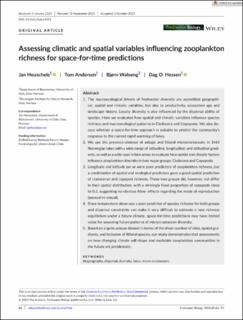Assessing climatic and spatial variables influencing zooplankton richness for space-for-time predictions
Peer reviewed, Journal article
Published version

Åpne
Permanent lenke
https://hdl.handle.net/11250/3111358Utgivelsesdato
2023Metadata
Vis full innførselSamlinger
- Publikasjoner fra CRIStin - NINA [2364]
- Scientific publications [1392]
Sammendrag
1. The macroecological drivers of freshwater diversity are accredited geographical,
spatial and climatic variables, but also to productivity, ecosystem age and
landscape history. Locally diversity is also influenced by the dispersal ability of
species. Here we evaluated how spatial and climatic variables influence species
richness and macroecological patterns in Cladocera and Copepoda. We also discuss
whether a space-for-time approach is suitable to predict the community's
response to the current rapid warming of lakes.
2. We use the presence-absence of pelagic and littoral microcrustaceans in 1465
Norwegian lakes with a wide range of latitudinal, longitudinal, and altitudinal
gradients, as well as a wide span in lake areas, to evaluate how spatial and climatic factors
influence zooplankton diversity in two major groups: Cladocera and Copepoda.
3. Longitude and latitude per se were poor predictors of zooplankton richness, but
a combination of spatial and ecological predictors gave a good spatial prediction
of cladoceran and copepod richness. These two groups did, however, not differ
in their spatial distribution, with a strikingly fixed proportion of copepods close
to 0.3, suggesting no obvious Allee- effects regarding the mode of reproduction
(asexual vs sexual).
4. Since temperature alone was a poor predictor of species richness for both groups
and dispersal constraints can make it very difficult to estimate a new richness
equilibrium under a future climate, space-for-time predictions may have limited
value for assessing future patterns of microcrustacean diversity.
5. Based on a quite unique dataset in terms of the sheer number of sites, spatial
gradients, and inclusion of littoral species, our study demonstrates that assessments
on how changing climate will shape and modulate zooplankton communities in
the future are problematic.
biogeography, dispersal, diversity, lakes, micro-crustaceans
